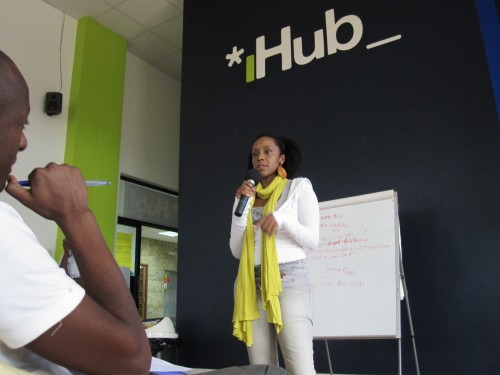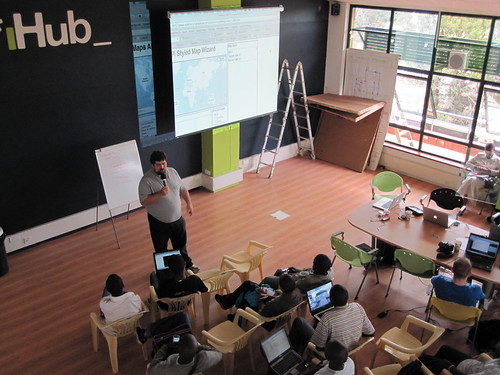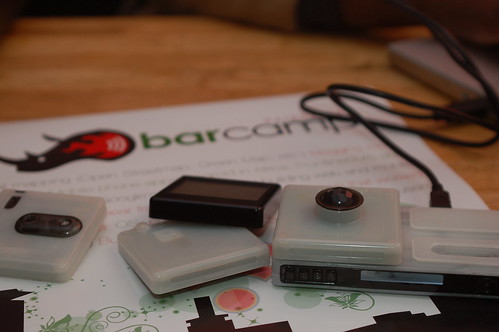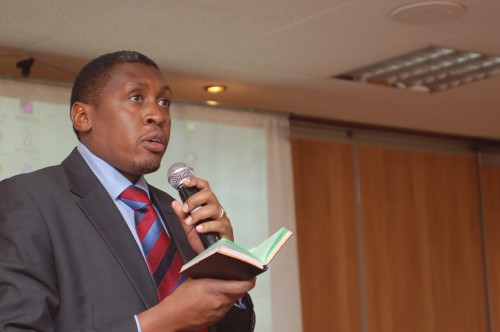Today is only a half day at Barcamp Nairobi 2010. We’re getting underway, and there are 5 talks so far:
- 9 colloquial Kenyan languages in Whive.com by John Karanja
- Live mapping using OpenStreetMap and GPS units by @mikel
- “Build a Drupal site in 20-minutes” by @batje
- “Geek girls in Nairobi” by the Akirachix
- Explaining the Kenya ICT Board $3m grant by @Kaburo
- Google Geo API
The $4 Million Kenya ICT Board Grant
“US$ 4 Million of the proceeds for Grant Applications for the development of digital content and software applications.”
It was announced 10 days ago, and there are already 500+ applications. Final applications are due by July 19, 2010.
$10k for individuals and $50k for organizations. That is a Kenyan citizen and above 18 years old, for companies, you have to be registered in Kenya. You have to show your resume/CV for the leadership team.
The application can be done online.
Two main areas of the grant:
- Government services and applications (5 ministries)
- Any innovative ideas around digital content and software
The first 46 grants will be handed out to both private and public sector ideas and applications. More grants will be given out to companies (30) than private individuals (16), but there will be an equal split between the two groupings.
Grants announced on August 15th, 2010, at which point they will be working on contracts. The grant will be given out in 3-4 tranches, starting in October 2010. The funds have to be spent within 12 months. There will only be 46 grants given out this year (2010).
A single company can apply in multiple rounds for a grant, but will only be given one grant per round.
What protection will your idea be given? The team looking at and reviewing/judging the applications will be signing NDAs. There are 9 judges who will decide the winning proposals, and they do plan on sharing the names of those individuals.
Some people are worried that if they have a new idea, and they’re working for a company, that that company will own it and not them. Kaburo Kobia is suggesting that if they believe that is really the case, then the individuals should break away before then.
If you have any questions, make use of their website, send them an email at grants@ict.co.ke, call them at +254-020-2211960 or visit them on the 12th floor of Teleposta towers.
Google Maps API
Mano is one of the top engineers from the Google Maps team and he was flown out to Kenya specifically for Barcamp Nairobi. He’s giving an overview of what can be done using their API, well beyond the normal pointal use that we see all the time.
I asked him what they’re doing about offline mapping, especially for those of us in Africa who don’t have the same access to connectivity. Mano says that they’re concerned about offline maps as well, which they don’t offer, but not for the reason I suggested. Instead, they see most of the people in the world accessing maps via mobiles, so they need to be able to let that happen when data capability is not within range.
]]>
AfriGadget makes the Time.com list of “Top 50 Websites of 2008“. Completely unexpected, and thrilling to see. Thanks to all the editors like Steve, Juliana and JKE too.
Met up with an incredibly talented mobile phone application creator, Steve Mutinda, (J2ME) with two very cool mobile phone apps. Full video interviews on him too, and have just posted the first article.
Got together with some local Kenyan tech guys and we’re hacking away on a BugLabs BUGbundle, trying to get a cool app up and running on it by Barcamp Nairobi this weekend. Posting pictures on that soon.
Met up with a ton of local guys, with some really interesting projects and ideas that I’ll be blogging about soon. Including big thinker Al Kags of the ICT Board, talented designer Fadz of Ark, Matere Lutische with a really cool idea, and many more…
Redid the Ushahidi wireframes, and meeting with some local developers to help build version 2 with us. Got some neat stuff up our sleeves, and one big surprise for Saturday’s Barcamp.
Went and watched a lot of rugby (Pictures are up at Flickr), including Quins vs KCB, RVA vs Mang’u and the Safari Sevens veterans. I love rugby season, only wish I could play too.
Finally, the windup to tomorrow’s Barcamp Nairobi is at an end. Thanks to Google Kenya, Strategiclee, the Kenya ICT Board and Ushahidi for sponsoring it. We’re all set and ready to roll at the Jacaranda Hotel (Pizza Garden side). Should be a blast, and there will be a lot of pictures and posts to come.
]]>My take is that Africa needs a mobile payment system, akin to PayPal, that is both carrier and bank agnostic.
We’ll see if my definition of what it takes for eCommerce to work is the same as theirs.
NOTES from the meeting after the jump (long)
The private sector
Kevit Desai, Director of the Kenya Private Sector Alliance and the Kenya ICT Federation, starts off by reminding us that eCommerce effects all industries in Kenya, from health care to agriculture.
Marcel Werner, Chairman of KIF, steps up to state that eCommere will add 1% to Kenya’s GDP. Kenya is a champion in many areas, but not in eCommerce. There aren’t a lot of nations in Africa working in this area, except Rwanda, and he believes that Kenya should win that race. He states that eCommerce spurs entrepreneurship and innovation.
One of the great opportunities is in tourism, one of Kenya’s staples. However, eCommerce isn’t only for external forces and the export market, but also for domestic trade. Listing; rural B2C, B2B and G2C, also agricultural trade, healthcare, domestic trade, utilities, etc…
Gaps in the current legislation include the bills being light on fraud, the fact that liability ISPs aren’t defined and express support for eGovernment transactions. Beyond legislation though, which international affiliations should Kenya have? How does Kenya organize for arbitration?
Marcel talks a little about “transport”, as it relates to order fulfillment. It’s easy to sell things online, it’s hard to fulfill and deliver those orders. (I agree, fulfillment is a big deal. However, I also think that the private sector tends to figure this out pretty well, no matter the environment. Now, I don’t agree that it’s particularly easy to buy things online in Kenya right now though – not for the average person anyway.)
Kenya Law as it applies to eCommerce
Michael Murungi, Advocate Asst Editor of Kenya Law Reports. Defining eCommerce: Any form of business transaction in which the parties interact electronically rather than by physical exchanges or direct physical contact.
Why legislate? To legalize, facilitate or control/regulate eCommerce? Michael states that the primary reason for legislation is to facilitate better eCommerce and to protect parties doing transactions. Examples are the need for laws that help with personal privacy. Believes that we don’t need multiple regulators for this industry either, but just a single one for efficiency. However, that governing body needs to be split up between administrative and regulatory areas.
He wonders if the provisions that Kenya is thinking of putting into place don’t foreclose on future developments in e-cash. Examples include Chipknip in the Netherlands and the Octopus card in Hong Kong.
Michael talks about the need for ISP immunity – as it’s crucial to the ICT industry. ISPs should have no general obligation to monitor data traffic, unless the ISP becomes aware of illegal activity. Limitation of liability for transmitting, cacheing, hosting and third-party linking.
Finally, there is a need for prosecution for electronic crime and security.
Paul Kukubo, CEO of the Kenya ICT Board, has come up to talk about both the ICT Board’s mandate and how eCommerce applies to it. Four long term goals:
- Establish and market Kenya as a leading ICT country in Africa
- Promote ICT industries in Kenya
- Promote ICT institutions (ex: ICT Board, KIF, etc.)
- Widen the services of ICTs for all Kenyans
The web plays a very large part in ICT in this space. Paul has had a great deal of experience implementing eCommerce in the private sector (previously at 3Mice). eCommerce legislation is important in order to increase the amount of transactions that could be taking place in Kenya. We don’t see enough eCommerce activity in Kenya… yet. Part of the ICT Boards responsibility is to raise awareness of eCommerce in the country.
A lot of the eCommerce activities will take place over the mobile phone. We must recognize that as the medium for the future for Kenya. I wouldn’t be surprised if MPesa does more transactions than some small banks. We must be aware of how our population is accessing goods and services through technologies.
Paul breaks into some thoughts on digitizing of forms and documents. Right now there is a propensity to store these documents in hard copy, and not digitally. Paul believes that they might be more secure saved digitally rather than in paper. Example given of a land deed contrasted to a banking/sale transaction for that property.
People are looking for goods and services that simplify their lives. So, what should the exclusions be in the laws? What are the principals behind them, rather than just the exclusions themselves? We see a world in which every record will be a digital record – in 10 years. So these are serious questions.
For international business, it’s incredibly important that we have legislation for data protection and privacy. If business process outsourcing (BPO) is one of the larger initiatives that we’re looking to do, then we must understand that the right legislation to attract international business is critical.
Dr. Juma Oketch, head of the e-government secretariat in the Office of the President – directly connected to the Ministry of information through the Kenya ICT Board.
]]>



